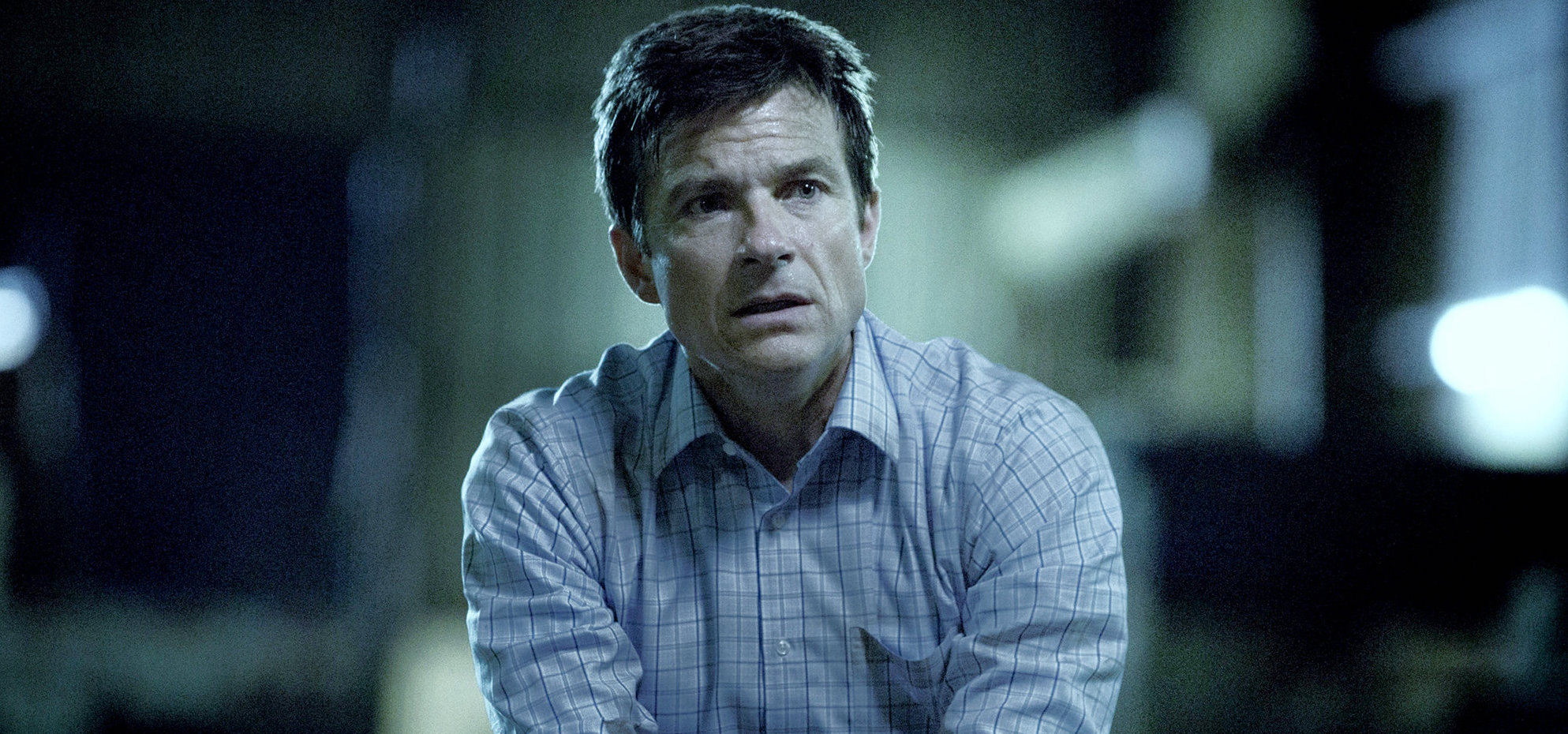
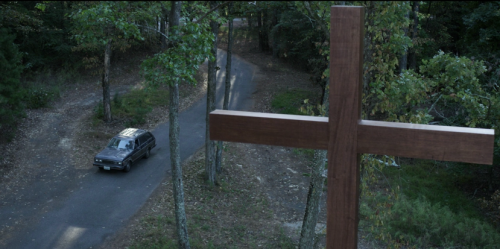
There is a moment deep into Netflix’s underrated Ozark (spoilers below), where the raising of a cross atop a church emits ripples of fear, as if recreational Missouri were ancient Rome. Whatever the show’s imperfections, I submit that restoring a sense of the scandal of the cross to America’s Bible belt is a considerable accomplishment. For the most part, the sex and violence in this show is more narrative tool than titillation – though I do wish there had been less of it. Even so, while most critics have fallen into lock-step complaint that Ozark is not Breaking Bad, I found Ozark considerably better than its predecessor. For while Breaking Bad offered an extended commentary of the cult of Santa Muerte, the world of Ozark is haunted by that death cult’s only known rival: the cross.
On the surface, the reason the church-topping cross radiates terror is straightforward enough. Marty Byrd, a money-laundering upstart from the Chicago suburbs, had thought an Ozark congregation was virgin territory for cleaning drug money in Missouri, hence he offered to build the local pastor, Mason Young, a permanent church. But this Christian drug front, it turns out, was taken. Jacob Snell, the local Missouri heroin dealer, had already concocted a successful laundering operation comprised of recreational boats gathered on the Sunday morning water, with heroin easily distributed to select parishioners via hollowed-out hymnals. Because a landed church would destroy Snell’s distribution network, Snell issues an ultimatum to Marty Byrd: If construction on the landed church continues, Snell will kill the pastor’s pregnant wife. When we see the cross, we remember this threat, hence the ripples of fear.
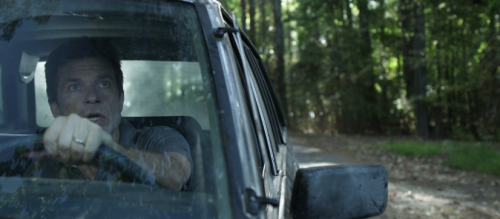
But time expended on Netflix is too precious to stop with this surface interpretation. On a deeper level, the cross raised high over the Ozarks does not signify only Snell’s ultimatum, but God’s. If we take our cues from the book of Romans, the cross evokes God’s rebuff to everyone in the series, his reproach to each of their intermingling agendas. The raised cross signifies God’s disgust with Snell’s blood-soaked business fueled by lust for family honor, and the equally murderous Mexican cartel. Locals seeking to piece together a livelihood from the crumbs of the trafficking table, and the FBI agent seeking revenge on the heroin trade that made his mother a junkie, are equally laid bare.
By removing the cross and ceasing construction of the landed church, Marty manages to restore peace among rival drug runners, and at least temporarily saves the minister Mason Young’s wife. But not before Mason begins to ask questions which lead him to a lesson more valuable than most seminary degrees. The unsuspecting pastor finally learns what is actually motivating part of his congregation. Admittedly, not all of his flock has come for the heroin. The usher, who works for Snell’s drug ring, carefully distinguishes regular members from customers by color coding the hymnals. But this is no consolation at all, for Mason now knows his congregation is no club for the righteous. His wish-dream of Christian community is shattered. Unfortunately, this is such a stark shift in Mason’s perspective that he breaks down.
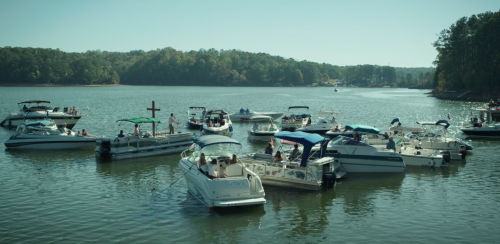
Snell tells pastor Mason the water services must continue or his wife will die. Nevertheless, Mason stumbles over Ephesians 5:11, “Have nothing to do with the fruitless deeds of darkness, but rather expose them.” His conscience prohibits him from proceeding, the sermon stops, and Snell exacts the punishment he promised. Mason’s wife is killed, though his baby is mercifully preserved. Following the murder, Marty, the suburban money-launderer, decides to pay Mason Young a consoling visit. And it is here that Mason, whose belief in God was understandably challenged, has his faith restored.
It is a fitting revelation straight from Paul’s greatest epistle: God comes into focus only when the sinfulness of humanity is revealed. During their brief visit, Mason names the devil in Marty, and in so doing sees what Marty cannot. The self-satisfied suburban Marty may not have committed adultery like his wife did, but his feeling sorry for himself is just as much of an obstacle to the relationship as an affair. Marty’s attempts to virtuously run a strip club are ineffectual and absurd. Marty’s claim that he is doing it all to provide for his threatened family, possibly helping out some unfortunate red-staters along the way, is the biggest lie of all. There is nothing for God to work with in Marty, no benign nature to be topped off with a splash of grace, no cardinal virtues to be supplemented with generous sprinkles of faith, hope, and love. Instead, everything must go.
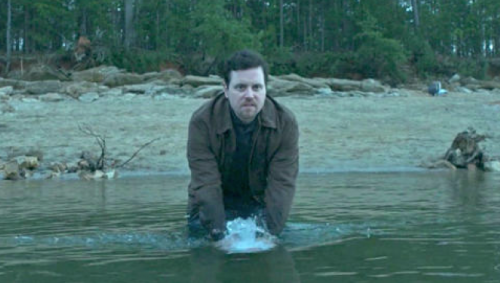
Having confronted Marty as the devil, Mason takes his new, as yet unnamed baby to the water and forces it under – the very thing Marty’s daughter Charlotte was unable to accomplish herself. The baby stays down long enough for us to suspect Mason to have snapped. But the child – after the ritual drowning is deemed effectual – does resurface. The tension extends to remind us, as Flannery O’Connor did in her short story The River, that baptism is execution. To drive home the point, Mason emblazons a cross on the newborn’s brow. We sense that Mason here returns to his own baptism as well. Which is to say, in Ozark’s final scene, Mason rediscovers that moment of surrender in which we first met him, blissfully drifting on his back on a lazy Ozark afternoon.
This new Mason Young, moreover, now does have a sermon to preach. There is heroin in all our hymnals, he could tell his maritime congregation, idolatrous attachments in every arena of human life, especially the sectors we consider benign. Lawlessness and lawfulness are both addictive, and no money is perfectly clean. Knowing our condition, God does not offer techniques of self-improvement, expert repair advice, habitual training in Aristotelian excellence or innovative life hacks, but the terminal grace of two brutish pieces of fastened wood. The equalizing message of the cross is as effective as an electric shock delivered to the unsuspecting victim of a rigged boat dock. All, blue state or red, sophisticated Chicagoans who campaigned for Obama or Missouri locals who probably voted for Trump, are under wrath, and yet Christ died for all. This is the way of God with sinners. The church is a motley band of boats, piloted by addicts, assembled for worship on the waters of baptism. We have magnificent plans for ostensibly altruistic landed church construction projects; but sometimes God simply asks us to float.


COMMENTS
5 responses to “Heroin in the Hymnals”
Leave a Reply













This is beautiful.
Now I have to figure out how to use Netflix….
Duo, I just started Netflix and will watch this one.
Outstanding movie
[…] In mid-July of 2020, an anime kid’s show that premiered in 2005 beat the Netflix drama Ozark for the longest tenure on the streaming provider’s Top 10 list. By that same metric, this anime […]